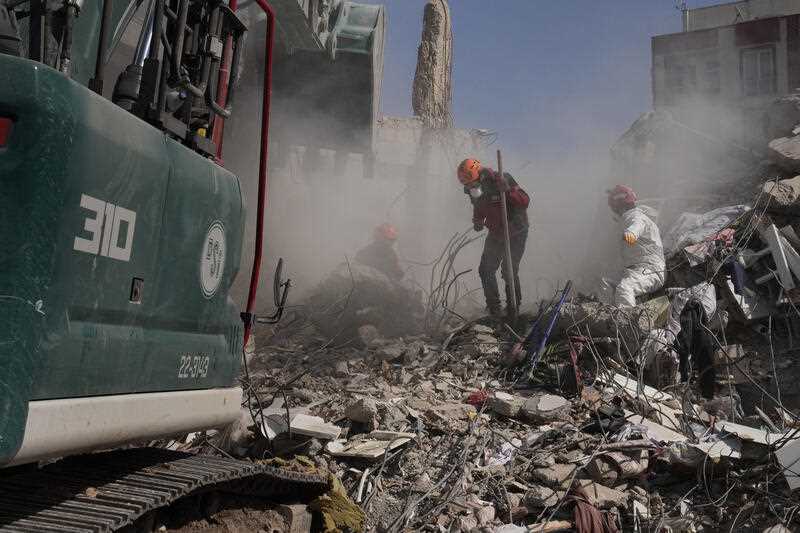Two women have been pulled from the rubble in Turkey’s southern city of Kahramanmaras and a mother and two children were rescued from the city of Antakya, as rescue efforts shift to getting relief to survivors nine days after a deadly earthquake.
Rescuers could be seen applauding and embracing each other on Wednesday as an ambulance carried away a 74-year-old woman rescued in Kahramanmaras, and earlier in the day, a 46-year-old woman was rescued in the same city, close to the epicentre of the quake.
Later in the day, a woman named Ela and her children Meysam and Ali were pulled from the rubble of an apartment block in Antakya – 228 hours after the earthquake.
The combined death toll in Turkey and Syria has climbed to more than 41,000, and millions of people are in need of humanitarian aid, with many survivors having been left homeless in near-freezing winter temperatures. Rescues are now few and far between.
Focus has shifted to supporting survivors and with much of the region’s sanitation infrastructure damaged or rendered inoperable by the earthquakes, health authorities face a daunting task in trying to ensure that people now remain disease-free.
The World Health Organisation on Wednesday said it was particularly concerned by the welfare of people in northwestern Syria, a rebel-held region with little access to aid. It asked Syrian President Bashar al-Assad to open more border crossing points with Turkey to allow aid to get through.
The stories of how people survived for days buried under the rubble also began to emerge.
Huseyin Berber, a 62-year-old diabetic, survived 187 hours after the collapsing walls of his home were propped up by a fridge and a cabinet, leaving him an armchair to sit in and a rug to keep him warm.
He had a single bottle of water, and when that ran out, drank his own urine, he said from a bed in Mersin City Hospital.
“I shouted, shouted and shouted. No one was hearing me. I shouted so much that my throat hurt… Someone reached their hand out and it met with my hand. They pulled me out from there. The hole I got out from was very small. That scared me a bit.”
In Kahramanmaras, homeless families slept in tents set up on the field and running track of the city’s stadium.
In one tent, 28-year-old Hatice Kavakdali clutched a grey teddy bear.
“I can’t put the experience we had into words. It was so terrifying and I am still feeling the pain of that,” she said. “I lost consciousness after the quake and I am still recovering. I couldn’t remember my family or how we got out of the house.”
Batyr Berdyklychev, the World Health Organisation’s representative in Turkey, warned the water shortage in quake-hit areas “increases the risk of waterborne diseases and outbreaks of communicable diseases”.
Across the border, in Syria, relief efforts have been hampered by a civil war that has splintered the country and divided regional and global powers.
“It’s clear that the zone of greatest concern at the moment is the area of northwestern Syria,” Mike Ryan, executive director of the WHO’s Health Emergencies Program, told a briefing in Geneva.
“The impact of the earthquake in areas of Syria controlled by the government is significant, but the services are there and there is access to those people.”
Parts of the provinces of Idlib and adjacent Aleppo held by Turkey-backed rebels suffered the bulk of the quake’s casualties in Syria – more than 4000 of a death toll exceeding 5800, according to the United Nations and government authorities.
By Henriette Chacar and Khalil Ashawi in Kahramanmaras
Get local, national and world news, plus sport, entertainment, lifestyle, competitions and more delivered straight to your inbox with the Canberra Daily Daily Newsletter. Sign up here.



